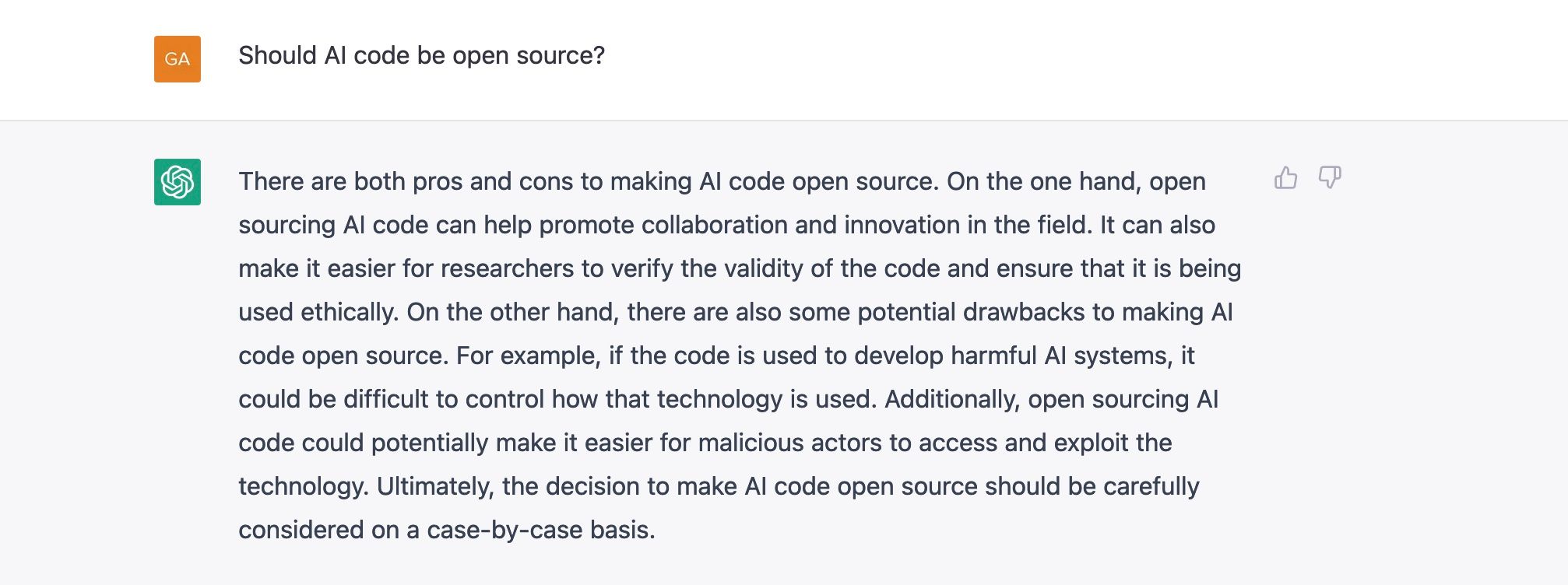Federal Trade Commission Probes OpenAI's ChatGPT

Table of Contents
FTC's Concerns Regarding ChatGPT's Data Practices
The FTC's investigation into OpenAI's ChatGPT likely centers on concerns surrounding data practices and their compliance with consumer protection laws. The sheer volume of data used to train the model raises critical questions.
Data Privacy Violations and Consumer Protection
ChatGPT's reliance on massive datasets necessitates a thorough examination of its data handling practices. The FTC is likely investigating potential violations related to:
- Consent for Data Use: Was informed consent obtained from individuals whose data was used to train ChatGPT? The lack of explicit consent could be a major area of concern. This includes the use of personal data scraped from the internet without clear attribution or permission.
- Data Breaches and Security: The vast amount of data collected poses a significant risk of data breaches. The FTC will likely scrutinize OpenAI's security measures to determine whether they are adequate to protect user data from unauthorized access and misuse. This includes examining safeguards against malicious actors attempting to exploit vulnerabilities in the system.
- Data Accuracy and Transparency: The FTC will likely evaluate the accuracy of the information ChatGPT provides and the transparency of OpenAI's data handling processes. Are users informed about how their data is used? Is there a mechanism for correcting inaccuracies?
Bias and Discrimination in AI Models
Another critical aspect of the FTC's investigation is likely focused on potential biases embedded within ChatGPT. The biases present in the training data inevitably manifest in the AI's responses, leading to potentially harmful consequences. This includes:
- Gender Bias: ChatGPT's responses might reflect and perpetuate societal gender stereotypes.
- Racial Bias: Similarly, racial biases embedded in the training data can lead to discriminatory or offensive outputs.
- Other Forms of Discrimination: The investigation will likely examine the potential for other forms of algorithmic discrimination, including bias based on age, religion, or other protected characteristics. The potential for these biases to reinforce existing inequalities is a key concern.
Impact on OpenAI and the Future of AI Development
The FTC's investigation will undoubtedly have a significant impact on OpenAI and the broader AI landscape.
Potential Penalties and Regulatory Changes
The investigation could result in substantial consequences for OpenAI, including:
- Financial Penalties: Significant fines could be levied for violations of consumer protection laws.
- Operational Restrictions: The FTC might impose restrictions on OpenAI's operations, potentially limiting the use or development of certain AI technologies.
- Regulatory Overhaul: The investigation could spur the creation of new legislation specifically targeting the regulation of AI development and deployment, establishing clearer guidelines and stricter accountability. This could include stricter data protection regulations, similar to GDPR in Europe.
Implications for the AI Industry as a Whole
The FTC's actions set a precedent for the entire AI industry. Other companies developing and deploying AI systems will be forced to re-evaluate their practices. This could lead to:
- Increased Ethical Investment: Companies will likely invest more resources in developing and implementing ethical AI frameworks and compliance programs.
- Greater Transparency: There will be increasing pressure to improve the transparency of AI algorithms and data usage.
- Cautious Deployment: The industry may adopt a more cautious approach to deploying advanced AI systems, prioritizing safety and ethical considerations over rapid innovation.
The Public's Perspective and the Need for Transparency
The FTC's investigation reflects growing public concern about the potential for AI misuse and harm. Rebuilding public trust requires a commitment to transparency.
Public Trust and the Role of Regulation
OpenAI and the broader AI community need to demonstrate a commitment to transparency and accountability. This includes:
- Openness about Data Collection: Clearly articulating data collection methods and providing mechanisms for opting out.
- Clear Communication about Limitations: Acknowledging potential biases and limitations in the AI system.
- Addressing User Concerns: Establishing robust mechanisms for addressing user complaints and concerns related to data privacy, bias, or other issues.
Balancing Innovation and Regulation
The challenge lies in striking a balance between fostering innovation in AI and implementing effective regulations to protect consumers. This requires:
- Nuanced Regulation: Regulations should be carefully crafted to avoid stifling innovation while effectively addressing ethical concerns.
- Stakeholder Collaboration: Government agencies, researchers, and industry stakeholders need to collaborate to develop effective and responsible AI governance.
- Ongoing Dialogue: Addressing evolving ethical challenges requires continuous dialogue and adaptation of regulatory frameworks.
Conclusion:
The Federal Trade Commission Probes OpenAI's ChatGPT, marking a pivotal moment for the AI industry. This investigation highlights the crucial need for responsible AI development, prioritizing data privacy, ethical considerations, and transparency. The outcome will significantly shape the future of AI regulation and the responsible deployment of powerful AI tools like ChatGPT. The investigation serves as a stark reminder for all companies developing and deploying AI to prioritize ethical considerations and ensure compliance with data protection laws. Stay informed about the ongoing Federal Trade Commission Probes OpenAI's ChatGPT investigation and its implications for the future of AI.

Featured Posts
-
 Voennaya Agressiya Rf 200 Raket I Bespilotnikov Atakovali Ukrainu
May 16, 2025
Voennaya Agressiya Rf 200 Raket I Bespilotnikov Atakovali Ukrainu
May 16, 2025 -
 Kim Kardashian Testifies On Near Fatal Paris Robbery Experience
May 16, 2025
Kim Kardashian Testifies On Near Fatal Paris Robbery Experience
May 16, 2025 -
 Ufc 294 Chandler Doubts Pimblett Can Handle His Intense Pace
May 16, 2025
Ufc 294 Chandler Doubts Pimblett Can Handle His Intense Pace
May 16, 2025 -
 Navigating The Chinese Market The Case Of Bmw Porsche And Other Automakers
May 16, 2025
Navigating The Chinese Market The Case Of Bmw Porsche And Other Automakers
May 16, 2025 -
 Fentanyl Crisis The Cost For China According To A Former Us Envoy
May 16, 2025
Fentanyl Crisis The Cost For China According To A Former Us Envoy
May 16, 2025
Latest Posts
-
 Paddy Pimbletts Weight Gain 40lbs Heavier After Ufc 314
May 16, 2025
Paddy Pimbletts Weight Gain 40lbs Heavier After Ufc 314
May 16, 2025 -
 Paddy Pimbletts Fiery Response To Critics After Ufc 314s Chandler Fight
May 16, 2025
Paddy Pimbletts Fiery Response To Critics After Ufc 314s Chandler Fight
May 16, 2025 -
 The Awkward Truth About Paddy Pimblett Vs Michael Chandler A Ufc Veterans Breakdown
May 16, 2025
The Awkward Truth About Paddy Pimblett Vs Michael Chandler A Ufc Veterans Breakdown
May 16, 2025 -
 Paddy Pimblett Silences Doubters Following Ufc 314 Win Over Michael Chandler
May 16, 2025
Paddy Pimblett Silences Doubters Following Ufc 314 Win Over Michael Chandler
May 16, 2025 -
 The Paddy Pimblett Ufc 314 Hype Can He Live Up To Expectations
May 16, 2025
The Paddy Pimblett Ufc 314 Hype Can He Live Up To Expectations
May 16, 2025
